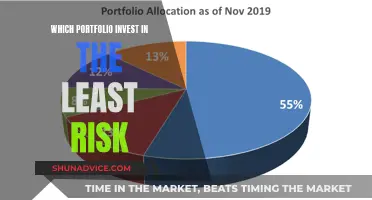
Investing in international equities can be a great way to diversify your portfolio and reduce risk. By investing in companies outside of your home country, you can gain exposure to multiple economies and tap into growth in foreign markets. International equities can also help you hedge against the risk of a strong U.S. dollar, as the value of your investments will not be solely dependent on the performance of the dollar. Additionally, investing in emerging markets can offer higher returns due to their high growth potential, although it is important to note that these markets also carry greater political and economic risks. While there are benefits to investing in international equities, there are also some downsides to consider, such as currency risk and reduced liquidity. It is important to carefully research and understand the risks and potential rewards before investing in international equities.
| Characteristics | Values |
|---|---|
| Definition | Stocks purchased outside the US market |
| Types | Emerging market equities, sector-based international equities, country-specific international equities, region-specific international equities |
| Benefits | Diversification, higher returns, access to new growth opportunities |
| Risks | Currency exposure, political risk, liquidity |
| Recommended allocation | Vanguard recommends at least 20% of the overall portfolio; other experts recommend 30% or more |
What You'll Learn

International stocks can help diversify your portfolio
International stocks can be an excellent way to diversify your portfolio. By investing in companies based in other countries, you can gain exposure to emerging and developed markets outside of your domestic market. This diversification has several benefits.
Firstly, it reduces risk. If your domestic market experiences an economic downturn, having international stocks in your portfolio can provide a hedge against losses, as not all markets move in the same direction at the same time. International stocks can also help smooth out returns. For example, if your domestic portfolio declines, gains in your international holdings can offset this loss and provide a net positive return.
Secondly, investing in international stocks gives you access to new growth opportunities. Different countries are at different stages of economic growth, and by investing internationally, you can take advantage of the growth potential in emerging markets. For instance, investing in artificial intelligence in the emerging world may drive an appetite for semiconductors.
Thirdly, international stocks provide exposure to foreign currencies, creating another layer of diversification. Currency values fluctuate, and investing in international stocks can help neutralize these fluctuations. For example, if the US dollar falls, the value of your international portfolio, quoted in other currencies, may help offset this loss.
It is important to note that investing in international stocks also carries risks. These include currency exchange rate risk, political and economic instability, and increased transaction costs. However, these risks can be mitigated by investing in a mix of emerging and developed markets and by seeking the advice of a professional financial advisor.
In conclusion, international stocks are a valuable addition to your portfolio as they provide diversification, access to new growth opportunities, and a hedge against currency fluctuations. By investing internationally, you can reduce risk, smooth out returns, and take advantage of global growth potential.
Creating a Portfolio: Investing Cash for Beginners
You may want to see also

Foreign exposure can lower portfolio risk
Foreign exposure can indeed lower portfolio risk. While many investors have been enjoying the six-year rally in U.S. stocks, they may have overlooked attractive opportunities overseas. International exposure can lower risk in a stock portfolio. Over the past 65 years, a globally balanced hypothetical portfolio of 70% U.S. and 30% international stocks has produced better risk-adjusted returns and lower volatility than an all-U.S. portfolio.
Markets outside the United States don't always rise and fall at the same time as the domestic market, so owning both international and domestic securities can level out some of the volatility in your portfolio. This can spread out your portfolio's risk more than if you owned just domestic securities.
U.S. and international markets don't always move in the same direction. As one market goes down, the other may go up. As one declines, the other may hold firm, providing stability to your portfolio. By investing in international markets, stockholders reduce the impact of regional and country-specific economic downturns.
Long-term secular themes are developing around the world, resulting in competitive advantages for foreign markets in certain sectors. For example, renewable resources benefit from a push toward European energy independence. In emerging markets, investment in artificial intelligence will drive appetite for semiconductors.
While there are benefits to investing in international equities, there are also some downsides. One of the main risks is currency exposure. The value of a dollar will change compared to the value of the fund's base currency. When the dollar is strong, returns are reducible even in strong international stocks.
Political risk is also a factor. Investing in emerging markets creates the potential for massive returns, but these countries often go through spasms of upheaval and uncertainty. If a government faces turmoil, it will create a risk to investments in that nation.
Savings vs Investments: Where Should Your Money Go?
You may want to see also

International equities can lead to higher returns
Secondly, investing in international equities gives investors access to new growth opportunities outside the domestic market. National economies fluctuate, and different nations experience this slow-fast cycle at different times. While one nation is slowing, another is growing. By investing in international equities, a portfolio can balance the declines of one nation or region with the gains of another.
Thirdly, international equity funds create exposure to foreign currencies, which creates another layer of diversification. However, it is important to note that currency exposure works both ways. The value of a dollar will change compared to the value of the fund's base currency. When the dollar is weak, this will help boost returns even when the investment is performing weakly. However, when the dollar is strong, returns are reduced even in strong international stocks.
Lastly, international equities can lead to higher returns, especially in emerging markets. For example, India is one of the leading destinations for "friendshoring" in EM Asia, potentially boosting foreign direct investment and driving growth in the manufacturing sector.
Technology and Data Revolutionize Investment Management Strategies
You may want to see also

Currency fluctuations can impact investment performance
Currency fluctuations can have a significant impact on investment performance, and investors need to be aware of the risks and benefits. Currency fluctuations refer to the changes in the value of a particular currency compared to another. These changes affect exchange rates and are influenced by supply and demand dynamics, investor sentiment, and global economic conditions.
Firstly, currency fluctuations can impact the value of an investment portfolio. For example, if you hold international equities and the applicable foreign currency declines in value, the value of your portfolio may also decrease. Conversely, a strong foreign currency can boost returns, even when the investment is performing weakly. This is because the value of an investment is often tied to the strength or weakness of the underlying economy and its currency.
Secondly, currency fluctuations can affect trade balances and a country's ability to export and import goods. A weaker domestic currency can make exports more competitive in international markets, increasing trade surpluses. On the other hand, a strong local currency can reduce export competitiveness, leading to trade deficits. This, in turn, can impact the performance of investments in export-reliant industries.
Thirdly, currency fluctuations can influence foreign investment. A volatile currency can deter foreign investors due to increased risk perceptions. In contrast, a stable and strong currency can attract more foreign investment, fostering economic growth and potentially improving the performance of domestic investments.
Lastly, currency fluctuations can impact inflation rates, which, in turn, can affect investment performance. A weak domestic currency can increase the cost of imports, leading to higher inflation. In response, central banks may raise interest rates to counter inflation and support the currency, which can also impact investment returns.
To manage these risks, investors can use hedging strategies, such as investing in financial instruments like futures, options, and forward contracts to lock in exchange rates. Diversification is also key—spreading investments across multiple currencies and regions can reduce exposure to any single currency's fluctuations.
Lucrative Investment Management: A Career Path to Consider
You may want to see also

Geopolitical advantages and disadvantages of investing internationally
There are several geopolitical advantages and disadvantages to investing in international equities.
One key advantage is the diversification of your portfolio. By investing in international equities, you reduce the risk of your portfolio being affected by domestic economic and political events such as recessions, policy changes, and natural disasters. For example, if the domestic market experiences a downturn, the international market may continue to perform well, providing a buffer against losses. This is because markets outside the US don't always rise and fall simultaneously with the domestic market.
Another advantage is the growth opportunities that investing internationally provides. By investing in foreign stocks, you can access leading companies and visionaries such as Tim Cook with Apple, Jeff Bezos with Amazon, and Satya Nadella with Microsoft, which you would not be able to access by solely investing in domestic markets.
However, there are also geopolitical disadvantages to investing internationally. One of the main risks is currency exposure. The value of a dollar will fluctuate compared to the value of the fund's base currency, which can impact returns. For example, when the dollar is strong, returns may be reduced even on strong international stocks.
Political risk is another disadvantage. Investing in emerging markets may offer the potential for high returns, but these countries often experience upheaval and uncertainty, which can create risks for investments.
Additionally, finding buyers for international investments can be more challenging than for domestic stocks. With global economic uncertainty and constant political changes, international equities can be tricky to offload and are generally less liquid than other stock options.
In conclusion, while investing in international equities provides the benefits of diversification and access to new growth opportunities, it is important to carefully consider the geopolitical risks involved, such as currency exposure, political instability, and lower liquidity.
Labor-Saving Equipment: Worth the Investment for Automotive Division?
You may want to see also
Frequently asked questions
International equities can provide diversification to your portfolio, reducing the risk of failure and decline. They can also provide access to new growth opportunities outside the domestic market and exposure to multiple economies.
There are two major risks to investing in international equities: currency risk and geopolitical risk. Currency risk refers to the potential for losses due to fluctuations in exchange rates, while geopolitical risk includes instances of political unrest, economic instability, and limited liquidity in foreign markets.
You can buy international stocks directly on international exchanges if your brokerage account gives you access. Alternatively, you can access international stocks through American Depository Receipts (ADRs), which are certificates issued by U.S.-based financial institutions representing shares of foreign companies' stocks. You can also invest in international stocks through ETFs and mutual funds, which offer diversification and low expenses.







